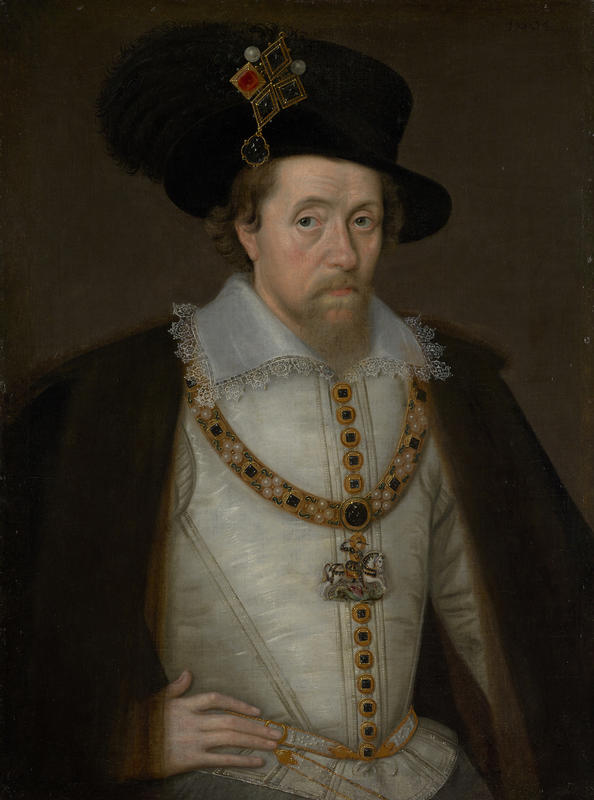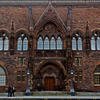More about James VI and I

Contributor
You'll notice that, despite the title, John de Critz's James VI and I, donated to Scotland by the Scottish lawyer Sir James Naesmyth in 1897, is a portrait of just one person.
The year of this portrait, James VI and I offered to merge England with Scotland and put everyone under one system of laws. After many years of arguing, he told judges in the Star Chamber, "You are so farre from making lawe…you have no voice in making of a lawe," and everyone stared at the floor like bashful puppies. The double-kingmanship of James VI and I, one guy with two crowns, King of Scotland first, then King of England and Ireland, fits right in with the rest of his extra-explosive career and life.
It was a lot of work to be King, because you have to explain to everybody that the Divine Being chose you, and nobody else but you, for the Crown, and therefore you are absolutely powerful. Meanwhile, this strange thing called common law, which probably came from those Norman invaders, is basically a pie-in-the-sky barefoot hippie Santa Cruz truckstop dream, and they need to drop it, because James VI is in charge, and the Almighty said so.
The thing about being divinely right is that you have to know your opposition. James became a specialist on demonology, publishing information to raise people's awareness of demons, and to explain why witch trials were necessary. And, of course, his real religious claim to fame is the sponsorship of a new English translation of the Christian Bible, aptly named after the pious monarch you see here.
Having published such an important book, you almost want to defend James from bad press like this: "His tongue too large for his mouth, which ever made him speak full in the mouth, and made him drink very uncomely, as if eating his drink, which came out into the cup of each side of his mouth…" Either Henry IV of France or Anthony Weldon originated the "wisest fool in Christendom" shtick about James VI and I. But Weldon got the credit/blame for this jab, which stuck: "A very wise man was wont to say that he believed him the wisest fool in Christendom, meaning him wise in small things, but a fool in weighty affairs." Interestingly, the figure of the fool in Shakespeare is close to a Divine voice at times, because the fool seems unbiased and unattached.
The jewel in his hat, the Mirror of Great Britain, is made of Elizabeth I's crown jewels, mixed with the jewels of Scotland, signifying their union in James' person. Around his neck, the King wears a badge of the Order of the Garter, because he's more chivalrous than you.
Sources
- Bannatyne Club. Publications, Vol. 111. Edinburgh: Bannatyne Club, 1863.
- Barnes, Thomas Garden. Law and Authority in Early Modern England: Essays Presented to Thomas Garden Barnes. Newark, DE: University of Delaware Press, 2007.
- Burton, John Hill. The History of Scotland: From Agricola's Invasion to the Revolution of 1688, Volume 6. Edinburgh: W. Blackwood, 1870.
- Fladmark, JM. Heritage and Museums: Shaping National Identity. London: Routledge, 2015.
- Kernan, Alvin B. Shakespeare, the King's Playwright: Theater in the Stuart Court, 1603-1613. New Haven: Yale University Press, 1997.
- Marshall, Rosalind. Mary, Queen of Scots. Edinburgh: National Museums Of Scotland, 2013.
- Tranter, Nigel. The Story of Scotland. London: Routledge, 1987.











